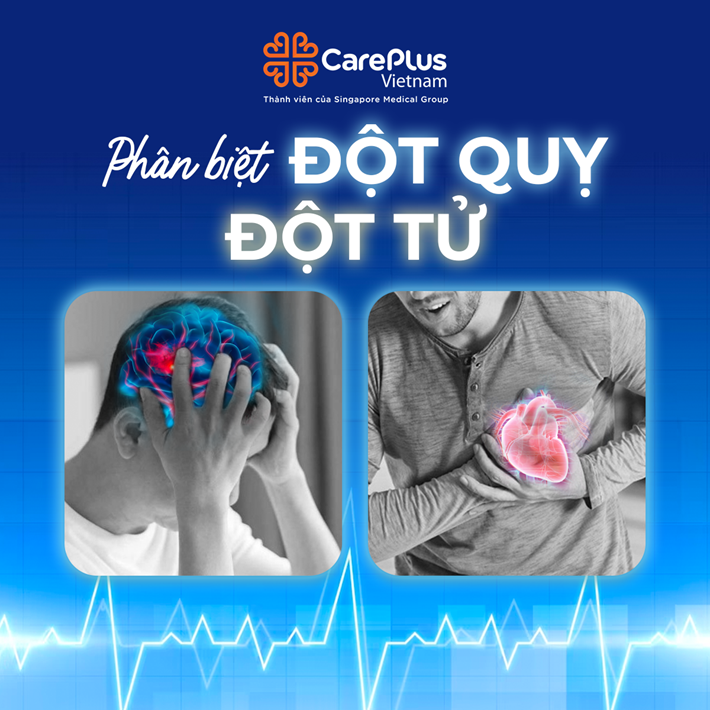UNDERSTANDING SUDDEN CARDIAC DEATH & STROKE AND EFFECTIVE DISEASE PREVENTION
Sudden cardiac death and stroke are currently alarming and dangerous diseases. However, many people still confuse and have a limited understanding of these terms, as well as how to prevent and manage them in unexpected situations...

6/8/2023 2:24:59 PM
To put it simply, these are two completely different diseases. Stroke is a cerebrovascular event characterized by sudden paralysis of one side of the body, falling, and possibly accompanied by unconsciousness. However, the heart continues to function normally, so death does not occur immediately. Sudden cardiac death, on the other hand, refers to the sudden cessation of heartbeats without warning. In most cases, it leads to immediate death unless emergency medical care is provided in a timely manner.
👨⚕️ Shared by Dr. Hoang Cong Duong - Medical Director, Head of Cardiology Department at CarePlus International Clinic
DISTINGUISHING SUDDEN CARDIAC DEATH & STROKE
SUDDEN CARDIAC DEATH
🔸 What causes Sudden Cardiac Death?
The heart is the main engine of the body, pumping blood to nourish all organs. The engine stops working either due to (1) "fuel blockage" or (2) "power failure." (1) Fuel blockage occurs when the fuel line (coronary arteries that supply the heart) is obstructed, preventing blood from reaching the heart cells. This condition is known as CORONARY ARTERY DISEASE. (2) The heart beats due to the presence of a small generator that produces a continuous and regular electrical current, which spreads throughout the heart via the electrical system. When this generator weakens or the electrical system experiences a "short circuit," the heart will experience a "power failure" and stop functioning. This condition is known as CARDIAC ARRHYTHMIA.
🔸 How to identify the risk of Sudden Cardiac Death?
Sudden cardiac death rarely occurs in a completely healthy heart. It mostly happens to a "diseased" heart that has not been diagnosed. Some signs indicating the possibility of cardiovascular disease and the risk of sudden cardiac death include:
- A family history of sudden death or unexplained death at a young age.
- Family members with inherited cardiovascular diseases such as Brugada syndrome (cardiac arrhythmia) or hypertrophic cardiomyopathy.
- Smoking, obesity, stressful lifestyle, and lack of physical exercise.
- High blood pressure, diabetes, or poorly controlled lipid disorders.
💖💖 The most effective way to "PREVENT SUDDEN CARDIAC DEATH" is to have regular check-ups with a specialized cardiologist.
🔸 What will the Cardiologist do to assess the risk of Sudden Cardiac Death?
First, the cardiologist will gather detailed information about the family history and any symptoms related to cardiovascular diseases, such as fainting, palpitations, chest discomfort, or shortness of breath during physical activity or climbing stairs. In addition to routine tests such as blood tests, electrocardiogram (ECG), and echocardiography, the cardiologist may request additional assessments, including (a) exercise stress testing and (b) continuous ECG monitoring with a Holter monitor for several days, to detect potential risks.
a. Exercise stress testing aims to evaluate the heart's response under maximum exertion to reveal any underlying cardiac abnormalities. During the test, you will undergo an ECG while cycling on an exercise bike or walking on a treadmill at various intensity levels as guided by the doctor. Any abnormality will be reflected in the ECG during the stress test.
b. Holter ECG (continuous multi-day electrocardiogram recording) is aimed at detecting abnormal heart rhythms that may be missed with conventional ECG monitoring. The doctor typically attaches a Holter ECG device to the chest, and you can go about your daily activities as usual for 3 to 7 days. The device will record the entire progression of your heart's electrical activity during sleep, periods of stress, physical exercise, or strenuous work.
Depending on the specific situation, a cardiologist may request further specialized investigations such as MRI imaging of the heart, CT angiography, or coronary angiography (DSA).
STROKE
🔹 Unforeseen Consequences of Stroke Stroke often results in brain damage, causing partial or complete paralysis of the body. Some complications may include: ▪️ Cerebral edema (brain swelling) ▪️ Seizures ▪️ Cognitive impairment ▪️ Loss of language function ▪️ Stiffness and difficulty moving the limbs ▪️ Deep vein thrombosis (DVT)
🔹 Treatment ▪️ Acute emergency care ▪️ Vigorous treatment to prevent cerebral edema ▪️ Specific treatment according to the type of stroke ▪️ Symptomatic treatment ▪️ Fluid and electrolyte balance correction ▪️ Surgical treatment, stem cell-based brain tissue restoration ▪️ Prevention of recurrence
Can Dangerous Cardiovascular Diseases be Treated?
Fortunately, the field of cardiology has made significant advances in treatment options, such as stent placement, pacemaker implantation, implantable cardioverter-defibrillator (ICD) for cardiac arrhythmias, and new-generation cardiac medications. All of these have proven to be effective in treating and preventing the risk of sudden death associated with many serious cardiovascular conditions that were previously difficult to manage medically.
Therefore, the key issue is early detection of cardiovascular diseases! Individuals with heart disease should undergo cardiac screening every 6 months or once a year. Even healthy individuals should undergo regular health check-ups to help identify any underlying cardiovascular risks at the earliest stage. Subsequently, a specialized doctor can initiate timely treatment measures to prevent disease progression.
🎯 Cardiac screening and regular health check-ups are crucial for preventing heart attacks and strokes. Currently, CarePlus International Clinic offers comprehensive cardiac screening packages with specialized examinations to detect early signs of disease. This allows for accurate diagnosis and the development of appropriate treatment plans based on each patient's health condition.